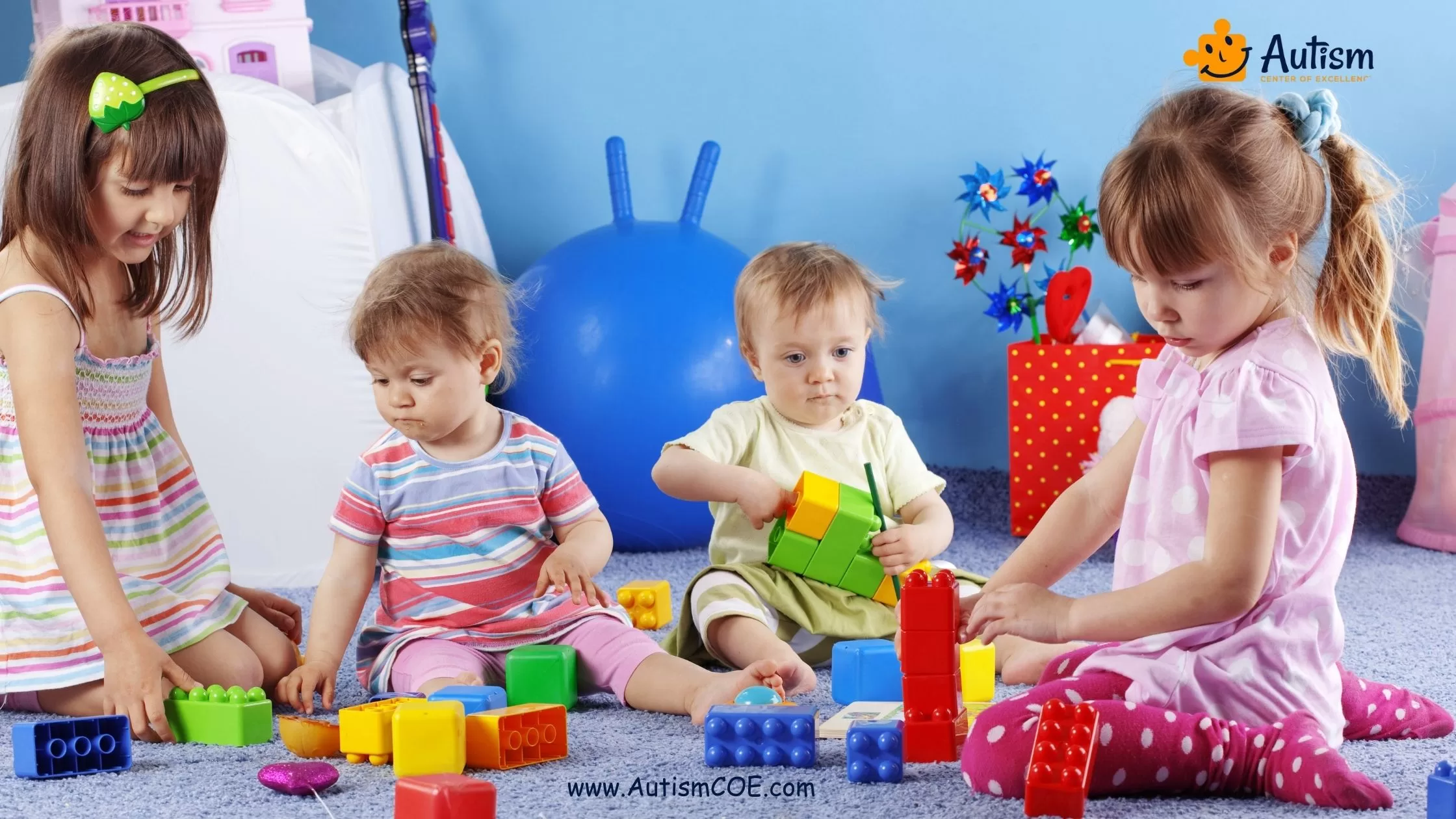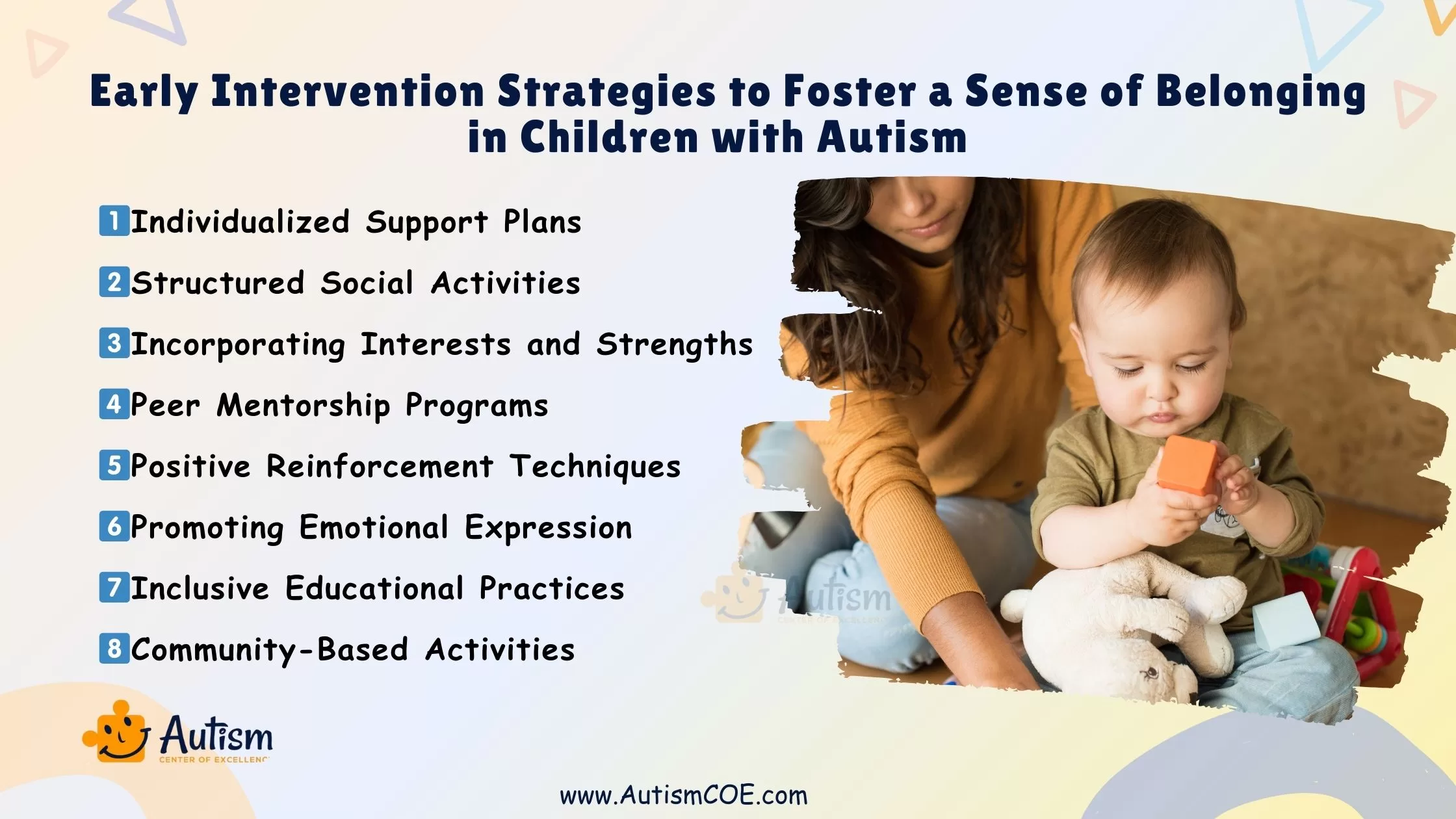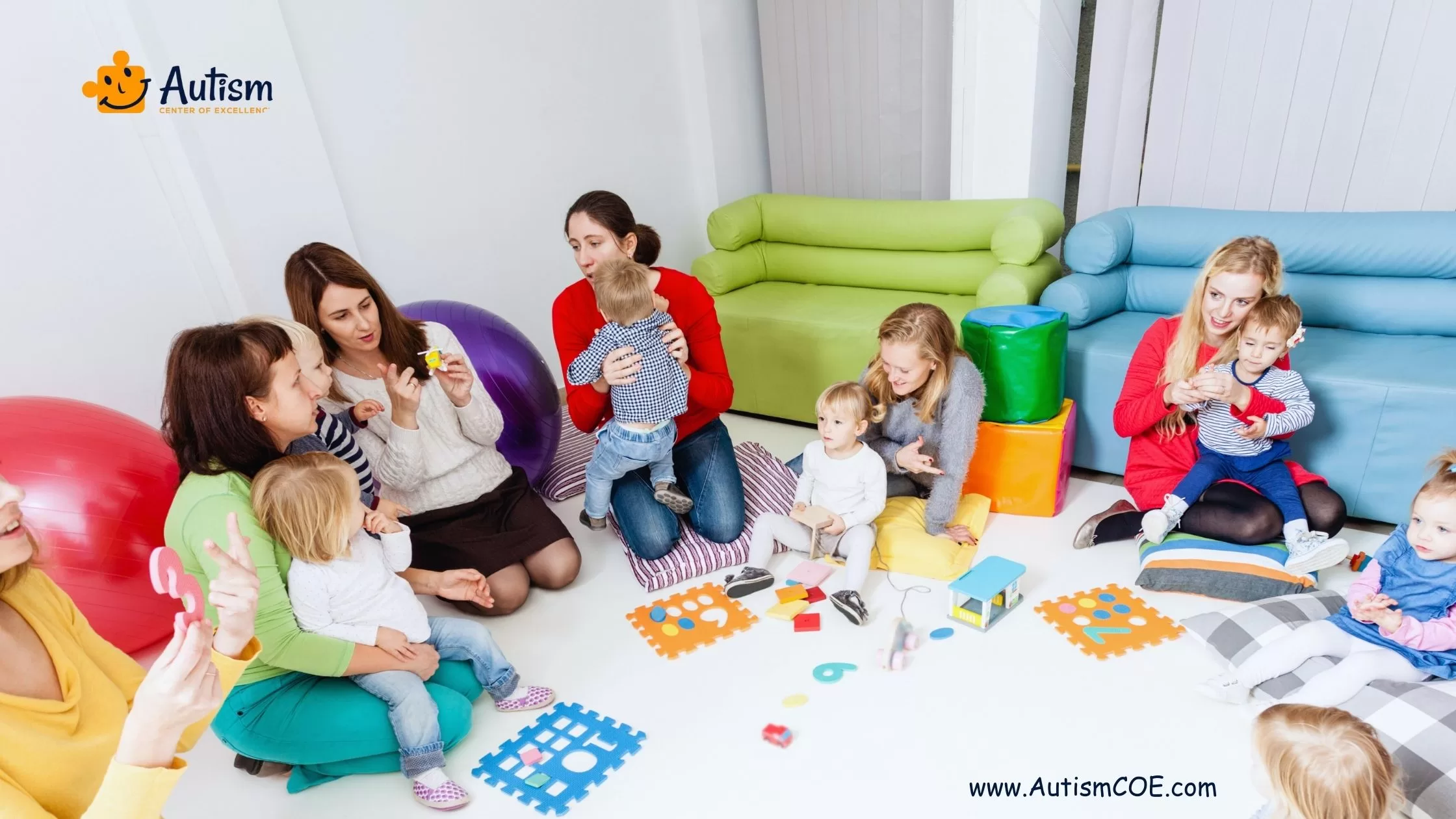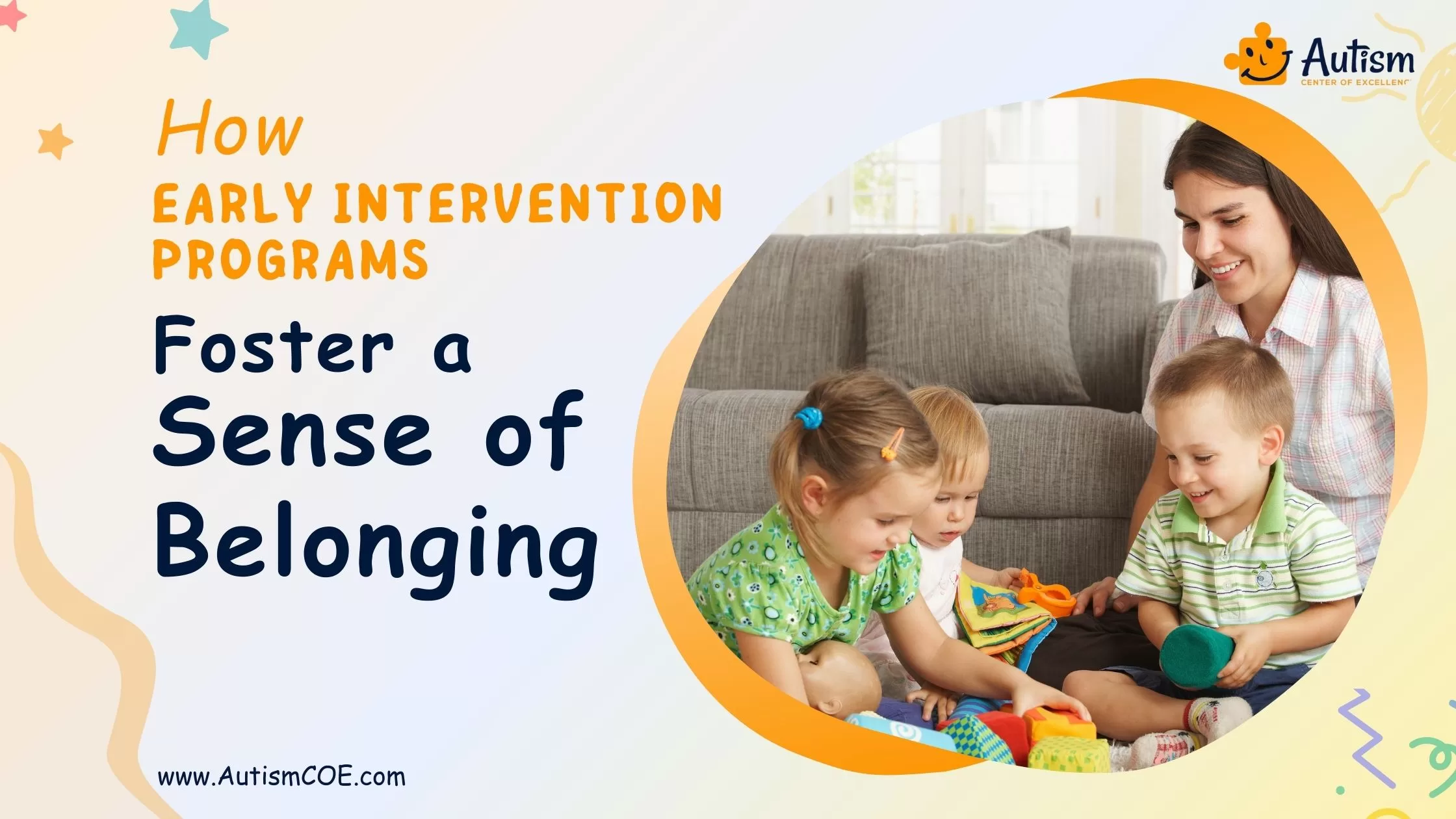A sense of belonging is vitally important for emotional well-being and social development in childhood. For children with autism, this process of establishing a sense of belonging can become life-changing. Indeed, the fundamental work of Early Intervention can establish and support tailored responses at crucial times to allow children to meaningfully connect with their peers and environment as a basis for positive development into adulthood.
Sense of Belonging works by fitting into a crowd; it gets individuality across and creates a sense of belonging within the community. For parents and ABA Therapists, working with these early intervention programs is valuable. They help the child in their proper development while preparing families with autism practices that have been helpful in managing their child’s disability.
“Early Intervention programs encourage exploration, social interaction, and relationship-building, nurturing a profound sense of belonging that enriches lives.”
What is the Sense of Belonging in Child Development?
A sense of belonging is a feeling of connection and acceptance within a group or community. It is an essential element for child development because it Fosters Emotional well-being, self-esteem, and a wide range of social development. Positive behaviors and involvement with other people are more likely to be developed in children who feel they belong.
For a Child with Autism, developing a sense of belonging is challenging. Social skills deficits in most cases accompanying autism leave children disengaged and less able to associate with others or develop interpersonal relationships, which they use to build a sense of who they are and their place in society.

What Factors Contribute to a Child’s Sense of Not Belonging?
These factors help to create supportive environments where all children, especially those with autism, can have an actual sense of belonging.
1. Social Exclusion
Children with autism are likely to be socially excluded owing to the lack of ability to understand social cues and participation in normative peer interactions. This is likely to culminate in isolation and a feeling of not belonging.
2. Lack of Understanding and Acceptance
Lack of understanding and acceptance by their peers and educators makes children generally unable to form relationships or feel included due to feelings of being different or unwelcome.
3. Inadequate Communicative Support
Children with autism often have poor supportive communication structures and lack strategies for easy expression, which leads to frustration or the feeling of disconnect from other individuals around them.
4. Overwhelming Environments
Unaccommodating environments can cause sensory overload in children and make them unable to participate, which might also deprive them of feeling part of the group.
5. Negative Peer Interactions
Bullying or rejection at the hands of friends can impact a child’s self-esteem significantly and affect how he perceives belonging within the community.
6. Rigid Expectations
Various settings in the environment with huge expectations and norms cannot fit the needs of these children in assonance, which in turn causes discomfort when such kids try to fit out.
7. Lack of Tailored Interventions
A child fails to receive due interventions and hence fails to be guided accordingly in social change, therefore having more sensation that they do not belong.
What Signs Indicate a Child Lacks a Sense of Belonging?
Finding out if your child feels isolated or does not quite fit is important to their emotional health.
1️⃣ Social Withdrawal:
Children may indicate isolation by preferring to play alone or avoiding groups. Watch for fear and reluctance or anxiety when it comes to new social situations, too, as well as potential difficulties with friends or making eye contact.
2️⃣ Verbal and Non-Verbal:
Cues Note expressions of exclusion or isolation. Some children may express these by word, while others may avoid talking or joining in with family or classroom activity.
3️⃣ Emotional Distress:
Mood swings, irritability, or sadness may indicate that they do not feel they belong, often with low self-esteem and self-confidence.
4️⃣ Challenging Behaviors:
This belonging frustration may then surface in more Challenging Behaviors. It’s this understanding of the same as a plea for help so caregivers can respond with empathy.
Through observation of these signs, parents and therapists can ensure that children with autism feel a sense of belonging, therefore helping them get connected meaningfully with their communities.
Enjoying Reading?
Join Our Weekly Newsletters!
Subscribe now to stay updated with our latest email updates.
Why is It Important to Foster a Sense of Belonging?
Fostering a sense of belonging is crucial for children’s development, especially for those with autism. Here’s why it matters:
Boosts Emotional Well-being
A good quality of belonging improves the emotional wellness of a child. This builds a launching pad for happiness and resiliency, which is crucial for any child who is on the autism spectrum.
Encourages Social Development
This respects the sense of belonging to develop social skills as children build friendships and positive interplay with their peers, which plays a key role in the children’s overall development.
Builds Confidence and Self-esteem
Being valued and accepted gives children a boost in their confidence, enabling them to explore their identities and capabilities in a safe environment.
Promotes Academic Success
Suppose the child understands the sense of belonging. In that case, they tend to be more engaged in education with motives, and this will eventually bring about excellent academic performances and interest in learning.
Strengthens Community Ties
Supporting the child to have a sense of belonging through support systems empowers the community to be more inclusive and supportive as well.

Early Intervention Strategies to Foster a Sense of Belonging in Children with Autism
Supporting children with autism in developing a sense of belonging is crucial for their growth and well-being. Here are some early intervention strategies that focus on individual strengths and foster inclusive and supportive environments.
Individualized Support Plans
Develop specific intervention programs for every child with intensive assessments and consulting together with experts that allow every child to have unique challenges, be it in communication or Sensory Sensitivities, and strengths, like artistic talents or problem-solving capabilities. In this way, children feel understood and appreciated, and their sense of security and motivation is promoted.
Structured Social Activities
Support social activity plans that foster teamwork and communication among children through group activities. These could be cooperative games, role-playing, or shared projects that help them develop friendships and extend their social skills. Supportive surroundings relieve some of the apprehension of being around other people and instill confidence.
Incorporating Interests and Strengths
Children have specific interests, be it trains, dinosaurs, and the like, so these can be utilized in therapy to make the activities of intervention interesting. Through these interests, the therapists capture the attention of their subjects while encouraging the involvement of the children and valuing their individuality with a positive attitude towards learning.
Peer Mentorship Programs
Create mentorship initiatives where children with autism can play, interact, or work with peers or mentors who share similar experiences. Such relationships will guide them through role models and social learning opportunities and can help them empathize and understand more about others.
Positive Reinforcement Techniques
Praise and reward desired behaviors with praise, rewards, or special privileges. This boosts confidence and consolidates achievement and inclusion. Recognizing the efforts and success of a child will motivate that child and support his development.
Promoting Emotional Expression
This involves teaching children to verbalize emotions safely by offering them tools and language so as to put into words their feelings. Create an environment wherein they can share emotions without judgment and help deepen their connection with other people.
Inclusive Educational Practices
Advocate for Inclusive Education through the use of teaching strategies that allow students with different learning needs, adaptive technologies, and differentiated instructions so all students can have access to the curriculum and receive equal respect.
Community-Based Activities
Engage in community-related activities like a club, sport, or volunteering. Such activities will expose them to many people, help them learn new things, and enhance social networking, thus helping in enhancing their social development as well as happiness.

The Role of Community in Building a Sense of Belonging
Community Involvement is important in creating a sense of belonging for a child who has autism. It offers support and inclusiveness, which play a fundamental role in a child’s development. Support at the community level enables a child to seek friends, enjoy activities, and be valued as part of something much bigger.
This encourages a sense of belonging in early childhood and helps the child develop an appreciation for the diversity of the other children and meaningful relationships. Facilitating community practices that celebrate each child’s uniqueness improves social skills and contributes to their emotional and psychological well-being.
As a child relates more to the community, becomes confident in it, and gets a better understanding of his role, ultimately gaining a rich and fulfilling life.
Frequently Asked Questions & Answer
What are Examples of a Sense of Belonging?
A sense of belonging manifests when children with autism are eager to participate in group activities. They can share their thoughts without showing discomfort, make meaningful friends, and have fun from being part of a community that values and loves their different contributions.
What to Avoid when Trying to Enhance a Sense of Belonging?
It is also important to be cautious not to force interactions nor create unrealistic expectations because these can produce pressure and exclusion. Avoid strategies that ignore the needs and preferences of children—Shun environments without understanding and inclusiveness.
How Do Sensory-Friendly Environments Foster Belonging?
In an inclusive environment, children with autism have a comfort zone that is comfortable and less overstimulated. They can participate without getting overwhelmed because such environments allow them to partake fully, thus creating a sense of belonging while feeling accepted and comfortable with others.
What Role Do Peers Play in Creating a Sense of Belonging?
Peers play an essential part by providing friendships, support, and opportunities for learning from the social world. Positive peer interactions help the child with autism feel accepted and valued, which positively contributes to their confidence and community engagement.
Conclusion
In essence, belonging is an essential part of fostering the emotional and social growth of a child who has autism. Early Interventions in various activities, support systems tailored to their personal needs, and active community integration help provide these children with the acceptance and encouragement they deserve to grow well.
Personalized plans focusing on individual strengths and interests combined with inclusive community practices create settings in which children feel valued and connected. As we continue to explore and implement these strategies, the Autism Center of Excellence remains dedicated to supporting children with autism and their families, providing valuable resources and insights to help build a more inclusive future for all.
Please Note: The content of this blog is for informational purposes only and should not be considered a substitute for professional medical advice, diagnosis, or treatment. Consult a qualified healthcare professional for personalized guidance tailored to your specific situation.

Bhavika Bhasin
Bhavika Bhasin is the Research and Marketing officer at AutismCOE. She works with children and adults with ASD. Her clinical research includes evaluating various available autism screening and diagnosis methods and their efficacy. She is currently developing a novel screening exam that is indicated to be more accurate than the existing available exams. She is also writes articles papers for various publications.


